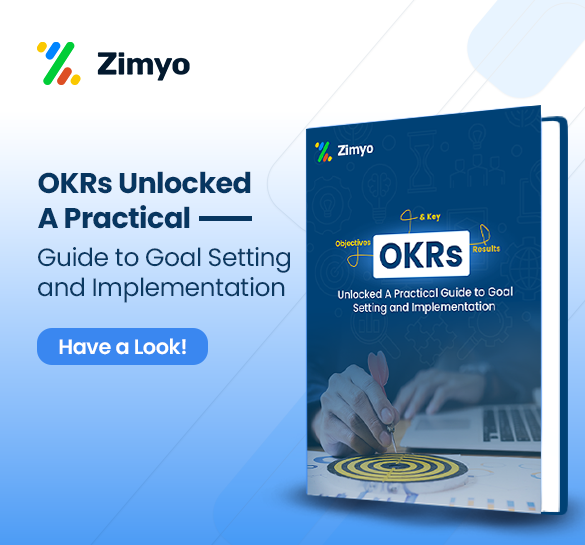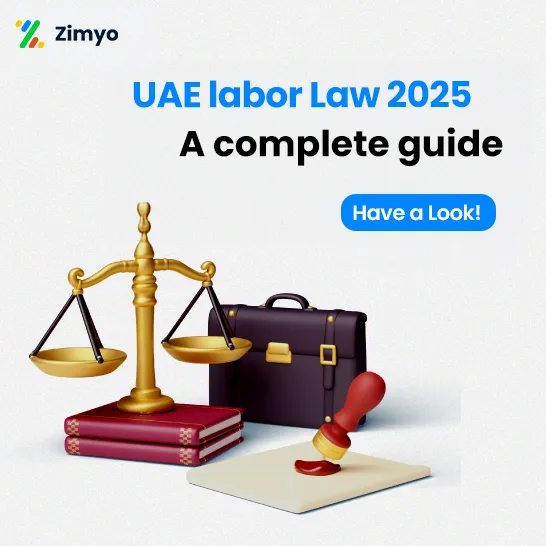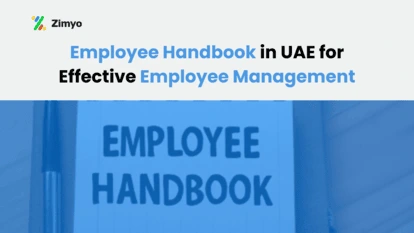The United Arab Emirates (UAE) has recently implemented significant amendments to its employment labor law. These changes aim to enhance transparency, fairness, and flexibility in the workplace, aligning with the dynamic needs of the modern labor market.
Being the HR manager are you worried about where to look for these changes? Do not worry any further, we have covered all the significant changes in UAE Labor law , providing insights and practical information.
What is UAE Labor Law?
The UAE Labor Law, officially known as Federal Law No. 8 of 1980, is a set of regulations that governs the relationship between employers and employees in the United Arab Emirates. This was replaced by the new UAE labor law on 2 February 2022. This law outlines various aspects of employment, ensuring fair treatment and protection of the rights of both employers and employees. It covers important topics such as working hours, stating that the standard workweek is 48 hours, with a maximum of 8 hours per day with changes during Ramadan.

The law also addresses leave entitlements, including annual, sick, and maternity leave, to support employees’ well-being. End-of-service benefits are mandated, providing employees with financial compensation based on their final salary and length of service. The UAE Labor Law further clarifies termination procedures, probationary periods, and disciplinary actions. Employers are obligated to maintain a safe working environment, and special provisions exist for the employment of minors.
It is mandatory for both employers and employees to adhere to the provisions outlined in the UAE Labor Law to ensure a fair and transparent work environment in the country.
What are the Changes in the new UAE Labor law?
Below are the significant changes that have taken place in UAE Employment Labor Law :
1. Changes in Emiratization Policy
UAE employment labor law introduced a revamped Emiratization policy, targeting the private sector’s employment practices. Under this policy, it is mandatory for private sector organizations registered with the Ministry of Human Resources and Emiratisation (MOHRE) to meet specific national employment ratios i.e. giving employment to UAE nationals. This ratio should start at 2% and increase annually until reaching 10%.
HR professionals must adapt recruitment strategies to align with these new requirements, promoting the employment of UAE nationals in the private sector.
2. Inclusion of Fixed-Term Contracts
The changes in the new law have removed indefinite contracts, and have made it mandatory that all employment contracts be fixed-term. The duration of fixed-term contracts typically aligns with the validity period of residence visas for expatriate employees which is 2 to 3 years. This significant shift in employment dynamics requires both employees and HR professionals to adapt to the new contractual changes and have clear communication and understanding between them.
HR professionals must adapt contract management practices to comply with the new regulations. In case to renew the contract there should be mutual agreement between both employers and employees. You must adhere to these laws to avoid any legal issues.
3. Modifications to Work Modes
The updates bring flexibility to work arrangements, introducing various work modes such as full-time, part-time, temporary, and flexible work. Recognizing the evolving needs of the modern workforce, the new law introduces part-time and flexible working arrangements.
This development of employment models has made it possible to match employee preferences and job requirements more precisely. Employees now have the option to choose from new working models, providing greater flexibility and adaptability.
Being HR, you must adjust your hiring and benefit plans to account for these various work styles to promote a flexible and well-balanced workplace. You must implement and manage these arrangements, ensuring they align with the organization’s objectives while catering to employees’ individual needs.
4. Guidelines for Termination Process
The new changes in the law introduce clear guidelines for termination by making it mandatory to adhere to the notice period specified in employment contracts. To ensure compliance with the law, the duration of the notice period is a minimum of 30 days and a maximum of 90 days. This means the employers need to provide at least 30 days prior notice to the employee before terminating them.
HR departments play a crucial role in ensuring compliance during the termination process. You have to ensure that the labor contract has a clear notice period mentioned and also make necessary arrangements to follow the law. Any Non-compliance may result in compensation equivalent to the notice period. Thus there should be transparent and fair termination procedures.
5. Resolving Labor Conflicts
The changes in enhancing the labor dispute resolution process have empowered the Ministry of Human Resources and Emiratisation (MOHRE) with greater decision-making authority. The MOHRE has been given authority, particularly in small-value disputes. Decisions made by the MOHRE now carry the force of execution, providing a more efficient mechanism for dispute resolution.
If the dispute crosses the jurisdiction of MOHRE the organizations can move to courts to settle the matter. You need to educate your employees regarding these changes and their rights so that it is helpful for them. You must also collaborate closely with the MOHRE to ensure adherence to the new procedures.
6. Changes during Probation Period
The employers still have the power to dismiss employees during the probation period, but the new changes introduce a 14-day probationary notice. This change emphasizes the importance of providing employees with adequate notice before termination during the probationary period.
In this change, both employer and employees have to provide a mandatory 14-day written notice during probation before terminating the contract. This promotes a more balanced and transparent approach to employment probation.
7. Modification in Working Days and Hours
The changes in the law have reduced the workweek to the UAE labor market, reducing typical working hours for private organizations from 48 hours a week to 40 hours. This adjustment, allowing for a 4-day workweek with 10 hours per day, reflects a commitment to improved work-life balance.
HR departments need to update policies and contracts to reflect these changes, ensuring compliance and a smooth transition to the new working hours model.
8. Alteration in Annual Leave
The new amendments in UAE employment law introduce several adjustments to annual leave entitlements. In addition to regular annual leave, employees now benefit from a three-day leave after the death of close family members, intermittent or consecutive parental leave of five days for six months after the birth of a child, and a 10-day study leave for qualifying employees.
HR professionals must update leave policies and communicate these changes to employees, ensuring they are aware of their entitlements.
9. Amendment in End-of-Service Gratuity
A significant change in the calculation of end-of-service gratuity shifts from a tenure-based system to one based on the number of working days. Furthermore, employees are now entitled to full gratuity even if they resign voluntarily.
HR departments need to adapt their processes for calculating and managing end-of-service gratuity, considering the new parameters.
10. Introduction of Unemployment Insurance Plan
The new law introduces an unemployment insurance plan for private sector employees. The plan aims to provide financial support during periods of unemployment, with different insurance premiums based on monthly income. While currently not applicable to employees in free zones, HR departments must ensure proper enrollment and communicate the nuances of this new policy to employees, ensuring they understand their rights and obligations.
Conclusion
The amendments to the UAE employment labor law promote a new era of transparency, fairness, and flexibility in the workplace. As HR professionals, employers, and employees navigate these changes, a proactive and adaptable approach is essential.
By understanding and embracing the nuances of the new regulations, organizations can ensure compliance, foster positive employment relationships, and create an environment that supports the growth and well-being of both employers and employees. To remain compliant with the laws and regulations of the UAE labor Law, you can use Zimyo Payroll software.
Zimyo is an end-to-end HR service provider with 48 modules to process payroll quickly, accurately, and within minutes. Zimyo handles all of your compliance needs, including professional tax, TDS, EDLI, PF, ESIC, etc.
































